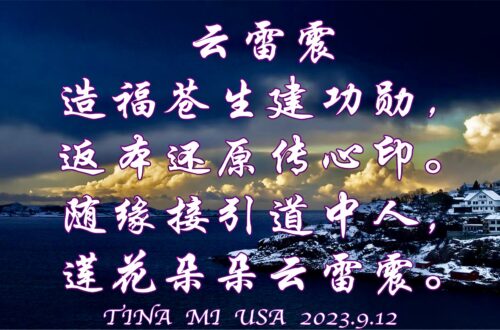Taking the Precepts as Your Master

Taking the Precepts as Your Master
Apr /1/ 2023 – Apr / 2/ 2023
Hello everyone, welcome to our Dharma talk at Dharma Rain Meditation Center.
The Shurangama Sutra says: Controlling your heart as the precepts, reaching the samadhi due to the precepts and getting the wisdom because of samadhi. We call it Three Non-Outflow studies. In April, May and June, we will discuss the precepts, samadhi and wisdom. It is well-known that the precepts, samadhi and wisdom is a summary of the Eightfold Path. They are three weapons to deal with desire, anger and ignorance, helping people ultimately relieve the afflictions and attain nirvana. The three are mutually reinforcing and are indispensable and complementary. As long as the practice Three Non-Outflow studies hard, it will surely lead you to an ultimate nirvana. Three Non-Outflow studies are ways to deal with three poisons. The prevention of evil is precepts; precepts can cope with desire; peaceful and no improper thoughts mean samadhi which could deal with anger; broken evil and enlighten the truth called wisdom which will eventually cope with ignorance. Therefore, learning from Three Non-Outflow studies is so critical to our cultivation.
What is a precept?
The Pali word for “precept” is a tilde, which contains the meaning of behaviour, habit, quality, nature, etc. It usually refers to moral norms, behavior standards, good morality, and kind behavior. From the original point of precepts, it aims to nurture good behaviour habits, develop good qualities, and increase (excellent) precepts study, preventing negligence from behavior, language, and mind. The main function is to eliminate evils. Because of their different identities, monks, bhiksuni, and home-based upāsaka and upāsika have different precepts.
However, when we read the biography of Buddha, we found no precepts when Sakyamuni Buddha founded Buddhism and led the regiment in the early days, so where did the precepts come from? It is the first question we are going to see.
There was a monk named Sudinna, the Kalandaka who dwelled near the village of the Vajjians. At that time, there was famine and alms were challenging to obtain. Sudinna decided to Vesali where his family was as they could provide him with plenty of donation. Once there, his mother asked him to beget offspring (with his former wife) to have an heir to their property. Sudinna consented. Before he came back to the village, Sudinna thought that he can be as tough as Buddha and do not have any desire for his wife, however, ,he finally had sex with his former wife. Then the Venerable Sudinna was remorseful and conscience-stricken.
The Blessed One for this reason, in this connection, having had the company of monks convened, questioned the Venerable Sudinna, saying: “Is it true, as is said, Sudinna, that you indulged in sexual intercourse with your former wife?” “It is true, Lord,” he said. The Enlightened One, the Blessed One, rebuked him, saying, “It is not fit, foolish man, it is not becoming, it is not proper, it is unworthy of a samana (effortful one), it is not suitable, it ought not to be done. How is it that you, foolish man, having gone forth under this Dhamma and Discipline which are well taught, are not able for your life to lead the holy life which is complete and wholly purified? How can you, foolish man, while Dhamma is taught by me in various ways for the sake of passionlessness, strive after passion? How can you, foolish man, while Dhamma is taught by me for the sake of being without fetters, strive after being bound? How can you, foolish man, while I teach Dhamma for the sake of being without grasping, strive after grasping?… It is not, foolish man, for the benefit of unbelievers, not for the increase in the number of believers, but, foolish man, it is to the detriment of both unbelievers and believers, and it causes wavering in some believers.” Then the Blessed One, having rebuked the Venerable Sudinna in various ways, and having spoken in dispraise of his difficulty in supporting and maintaining himself, of his arrogance, of his lack of contentment, of his clinging, and of his indolence; and having spoken in various ways of the ease of supporting and maintaining oneself, of desiring little, of contentment, of abandoning unwholesomeness, of being scrupulous, of what is 5 gracious, of decreasing defilements, and of the putting forth of energy, and having given a suitable and befitting talk on Dhamma to the monks, he addressed the monks, saying: “On account of this (offense), monks, I will make known the course of training for monks, founded on ten reasons: for the excellence of the Sangha, for the comfort (peace) of the Sangha, for the restraint of the shameless, for the ease of well-behaved monks, for the restraint of the outflows here and now, for the prevention of the outflows in the next life, for the benefit of non-believers, for the increase in the number of believers, for establishing the true Dhamma, and for fostering discipline.
The Buddha used s exaggerated tone to reprimanded the man. Then he assembled the Sangha, formulated the precepts and explained the meanings to everyone: “There are ten benefits from keeping the precepts. If you want to be a monk, you have to obey them. Refrain from killing sentient beings; Refrain from stealing; Refrain from unchastity sensuality, sexuality, lust; Refrain from lying; Refrain from taking intoxicants these five precepts are the fundamental liberation. If there is a person who breaks it, it is Pārājika sin (abandoning sin), one who is defeated (parajika), he is no longer in communion (with the Sangha), it is not a sin!
The Buddha issued a declaration of precepts, and thus this course of precepts was set forth by the Blessed One.
After the Buddha established the Basic Great Precept, there were still a few disciples who had done something that violated Buddha’s teachings. After a long period, the Buddha developed many precepts such as four parajika, thirteen sajghāvaśesa and thirty sargikapra-cittiya for monks; Three hundred and fifty precepts for Bhikkhunni. The Bodhisattvas have ten critical or forty-eight light precepts. A disciple who has converted to Sambo at home can be banished by the Five precepts or ,they can choose to obey Bodhisattvas’s precepts which have six critical or 26 light precepts to be a upāsaka or upāsika.
We can see that the precepts are the code of conduct created by the Buddha when he was leading the Sangha. The precepts’ main purpose is to eliminate evils and develop goodness, eliminate the afflictions, and keep the harmony of Sangha. In the last sutra taught by Buddha, the Buddha clearly pointed out that: “Bhikkhus, after my Parinibbana you should reverence and honour the precepts of the Patimokkha. Treat them as a light which you have discovered in the dark, or as a poor man would treat a treasure found by him. You should know that they are your chief guide and there should be no difference (in your observance of them) from when I yet remained in the world. If you would maintain the precepts’ purity in purity, you should not give yourself over to buying, selling, or barter. It would help if you did not covet fields or buildings, nor accumulate servants, attendants or animals. It would help if you fled from all sorts of property and wealth as you would avoid a fire or a pit. You should not cut down grass or trees, neither break new soil nor plough the earth. Nor may you compound medicines, practise divination or sorcery according to the stars’ position, cast horoscopes by the waxing and waning of the moon, or reckon days of good fortune. All these are things which are improper (for a Bhikkhu). Conduct yourselves in purity, eating only at the proper times and living your lives in purity and solitude. It would help if you did not concern yourselves with worldly affairs, nor yet circulate rumours. You should not mumble incantations, mix magic potions, nor bind yourselves in friendship to powerful persons, showing to them and the rich (special) friendliness while treating with contempt those lacking (in worldly wealth, power and so forth). All such things are not to be done! You should seek, with a steadfast mind, and with Right Mindfulness, for Enlightenment. Neither conceal your faults (within) nor work wonders (without), thereby leading (yourself and) other people astray. As to the four offerings, be content with them, knowing what is sufficient. Receive them when offered but do not hoard them. This, briefly, is what is meant by observing the precepts. These precepts are fundamental, (to a life based on Dhamma-Vinaya) and accord exactly with freedom, and so are called the Patimokkha. By relying on them, you may attain all levels of collectedness and the knowledge of the extinction of dukkha. It is for this reason, Bhikkhus, that you should always maintain the precepts in purity and never break them. If you can keep these precepts pure, you possess an excellent, but no merit of any kind will accrue to you if you do not do so. You ought to know that the precepts are the chief dwelling-place of the merit which results in both body and mind being at rest.
In summary, we can see that the precepts are so important in the Buddha teaching, which is more than the rules for the cultivation, it is also a teacher for our spiritual practice after Buddha left. 2500 years after Buddha’s age, things changed, and people change, we face various problems in our lives every day and suffered from them. We are so struggling to find quite answer; however, it is so hard. Maybe it is because we forget the Buddha’s last teaching, “taking precepts as your master”. When we face the temptation of five desires, we can simplify things and see where the problem is. Obeying the precepts that are the fundamental to a life based on Dhamma-Vinaya and accord exactly with freedom, by relying on them, you may attain all levels of samadhi and wisdom; this is the purpose of creating precepts.
thank you for the listening!






3 Comments
Get started
Your blog has swiftly become my preferred source for inspiration. Thank you for sharing your ideas.
Carroll
Your enthusiasm shines through every paragraph, serving as a inspiring reminder of the impact that authentic dedication can have.
Tiara
I could tell you’ve done your research, thanks.